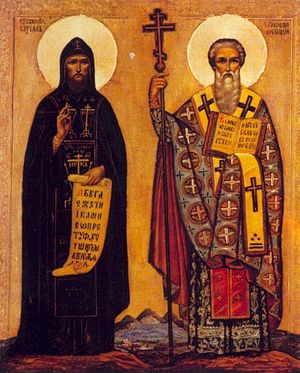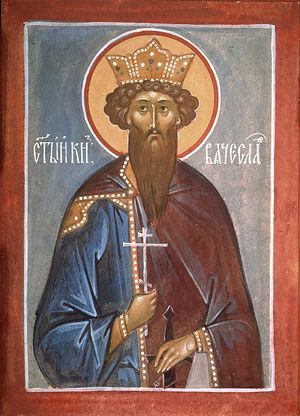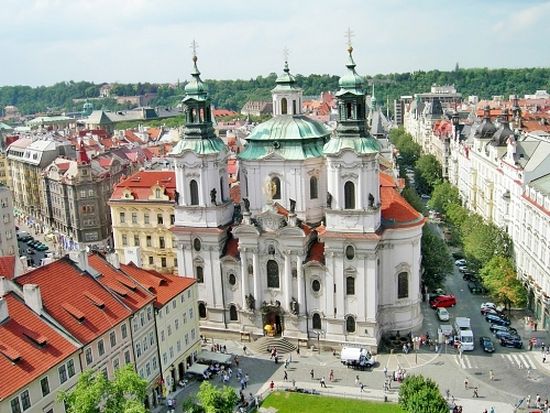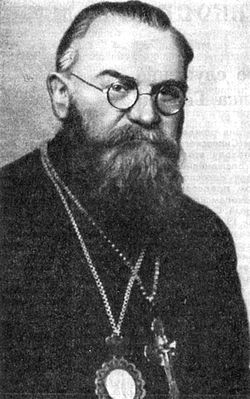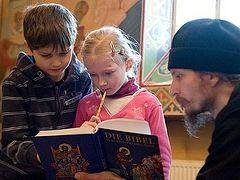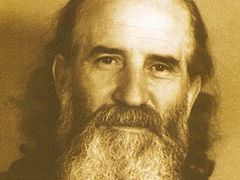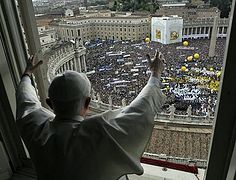Archbishop Joachim of Beroun (the Orthodox Church of the Czech Lands and Slovakia) talks about the life of this Local Orthodox Church, the difficulties it is faced with, the cooperation among the Slavic Churches and the destructiveness of schisms.
—Your Eminence, you speak Russian perfectly. Where did you study it?
—I lived with the brethren at the Holy Trinity-St. Sergius Lavra for seven years and formerly I used to go to Kiev—this is how I mastered the language. And now I have nearly forgotten it, because it is ten years since I moved back to Czechia and I speak little in Russian here.
I have come to Kiev on the invitation of His Beatitude Metropolitan Onufry—we have been friends for many years and this invitation has been a great joy for me. Metropolitan Onufry is known and loved everywhere. Of course, for the Ukraine it is a true grace of God that he was elected primate of the Ukrainian Orthodox Church (UOC MP).
—How does the Orthodox Church of the Czech Lands and Slovakia exist under conditions of bilingualism and the division of a once united country?
—We [Czechs] and Slovaks understand each other, and our languages are similar, like Ukrainian and Russian. After the dissolution of Czechoslovakia we had to summon an All-Church Council and change the Church statutes, so that we could live in the environment of two states.
According to the present Statute of the Church of Czech Lands and Slovakia, the Church jurisdiction covers two independent states: Czechia and Slovakia, and the Archbishop of Prague as well as the Archbishop of Presov can become its primate. So the full title of head of the Orthodox Church of the Czech Lands and Slovakia is: Archbishop of Prague, Metropolitan of the Czech Lands and Slovakia, or Archbishop of Presov, Metropolitan of the Czech Lands and Slovakia. The metropolitan unites us. But each of the two states has its own official representative of the Church to its government. In Czechia this is the Archbishop of Prague, in Slovakia this is the Archbishop of Presov, and one of them is the Metropolitan of the whole of our Church. Today our Church has four dioceses: those of Prague, Presov, Olomouc-Brno, and Michalovce. All the Synod members are ruling bishops and vicars.
There are some fifty thousand Orthodox Slovaks; Czechia has around twenty thousand Orthodox Czechs along with some one hundred thousand Orthodox Ukrainians and Russians. And thanks to them we have a “high level” of Church life. Ukrainians are helping Czechia a great deal and not only financially—they also teach us. People come from the Ukraine and “educate” us on how to live a genuine Church life, because they are from a country with a more traditional Orthodox culture. Our Church is still very young and inexperienced in many spheres of Church life—there is the lack of ancient monasteries, lack of confessors and elders. That is why it is significant for us that Russian and Ukrainian people are coming. It can be said that they make up the majority of our parishioners.
—Czechia is considered to be one of the most atheistic countries. Why?
—That is a difficult question. Czech people embraced Christianity during the missionary work of Sts. Cyril and Methodius. After the repose of St. Methodius all his disciples were imprisoned and then driven away from Moravia, most of them moving to Tsar Boris in the Balkans. Czechs and Moravians went under the influence of the Western mission, which they did not accept wholeheartedly. And to this day many of them regard Christianity as Catholicism. That is a problem. They do not understand that their faith originally was Orthodox. Czechs and Moravians perceive the faith as something that was imposed on them by others. I believe this explains why they remain indifferent to Christianity today.
Our task is to enlighten and return Czechs to their roots, to the faith of their ancestors. Formerly I was a Roman Catholic. Many of our clergy and faithful were then atheists, Catholics or Protestants. Only when we begin to read books, to seek for the truth, then we find Orthodoxy.
—Your Eminence, how did you personally become Orthodox?
—Studying at a high school I started reading Fyodor Dostoyevsky. Elder Zosima from the Karamazov Brothers was particularly interesting to me. I then read about the faith, God, monastic life and thus was converted to Orthodoxy at the age of nineteen. As a student—I studied at the Education department of Mathematics and Biology—I started attending a correspondence department of the Orthodox University. I travelled across Greece, Serbia, Romania, visited England, and venerated great shrines… And on my second year I went to Russia for a month where I made pilgrimages to holy sites.
—What was the reaction of your circle of friends, your family to your decision?
—My parents first were shocked. All our people thought that Orthodoxy is the “Russian faith”. But later my father and brother became Orthodox themselves. My mother remains a Protestant but she respects our faith. Even when I had an obedience in the Holy Trinity-St. Sergius Lavra, she came to see me. She immersed herself in the holy springs, but declined to venerate the icons.
Of course, Czech people are unaccustomed to being Orthodox. But I believe if we do missionary work, the people will come to understand that Orthodoxy is the faith of our forefathers, of ancient Moravia, of Sts. Cyril and Methodius and a multitude of other great saints, venerated in our land.
—Please, can you tell us a little about the saints now venerated in the Czech Republic?
—Our most beloved saints (as also for the Ukrainian and Russian people) are Sts. Cyril and Methodius, “the Teachers of the Slavs”, and also their disciples, Sts. Gorazd, Clement, Naum, Angelar and Sava. There is also the Holy Prince Rostislav who invited Sts. Cyril and Methodius.
We also greatly venerate St. Ivan (John) of Czechia. He was born into a noble family, a Croat by origin, and he became the first Czech hermit. He lived as an anchorite in the Czech forests, thirty kilometers (c. 18.6 miles) away from Prague. Interestingly, in the woods he met Borivoj I, Duke of Bohemia and husband of the Holy Duchess Ludmila of Bohemia. We celebrate a Divine Liturgy in the cave of St. Ivan every year. This cave is very beautiful and belongs to the Catholic Church. Every year on his feast-day Catholics lease it to us.
We also deeply venerate St. Wenceslaus, the Prince of the Czech Land, and his grandmother St. Ludmila. The relics of St. Wenceslaus are kept at the Roman Catholic Cathedral of St. Vitus in Prague. His head relic (as well as the head of St. Ludmila) is separated from the main relics and is kept at the same cathedral in a reliquary. And nearby, in the ancient Basilica of Great Martyr George the Victory-Bearer, the relics of St. Ludmila rest. We read the akathist before the relics on feast-days followed by the festal Liturgy at our churches. By the way, there are eight Orthodox parishes in Prague at the moment.
St. Procopius of Sazava who founded a monastery near the Sazava River and became its first abbot continues our list. He wanted to renew the eastern liturgy and rites. The Czech people also love Hieromartyr Gorazd (Pavlik), Bishop of Czechia, Moravia and Silesia—he is a martyr of the twentieth century. St. Gorazd was first a Roman Catholic priest but he converted to Orthodoxy and was consecrated a bishop in Serbia. On becoming an Orthodox hierarch he headed our autonomous region (at that time we were under the jurisdiction of Serbia; only after the Second World War were we transferred to the jurisdiction of the Patriarchate of Moscow and later were granted autocephaly—independence). Together with Ukrainians we also honor and commemorate St. Alexis (Toth) of Carpatho-Russia and the New Martyr Maxim (Sandovich) of Gorlice.
—How is your monastic life?
—That is a very difficult question. We have no confessors or experienced elders who would be able to form a monastery. And if there are no confessors, then novices are drawn to more traditional monasteries, and go away… At present we have the Holy Transfiguration Monastery at Milíkov-Těšov where three monks live, and the Convent of Sts. Wenceslaus and Ludmila at Lodenice. Officially we have other monasteries but without brethren. Some of our monks live on Holy Mount Athos and in Greece. We hope that now they are living at traditional monasteries under a good guidance and in several years will return and establish a monastery here in Czechia.
—And what is the attitude of young people towards Orthodoxy?
—I think we have very weak missionary efforts. Most Orthodox believers of today’s Czechia are Ukrainian and Russian people and we devote much energy to giving spiritual guidance to these parishioners. Even in Prague with its eight parishes we serve and preach in the Czech language only in one of them. Some Czechs understand Church Slavonic, but for the majority it is absolutely incomprehensible and foreign. When a Czech enters a church in which priests celebrate in Church Slavonic and preach in Russian, he thinks that it is a Russian church and leaves. So we try to alternate the litanies: we proclaim one in Church Slavonic and another in Czech. We need to work very hard in order to develop our mission. We also publish very few church books in Czech.
I will be frank: there is a poor missionary work in the Czech lands. The situation in Slovakia is much better as they have a strong theological department (faculty), a seminary; they have experienced teachers and professors, and their publishing activity is well-developed.
—How do you plan to develop your missionary work?
—First of all, we need to improve Orthodox education in the Czech Republic, to develop a theological department with the seminary where our clergymen will be educated, to perfect our Orthodox schools. The University of Karlovy Vary has an Orthodox sub-department, but without a seminary.
This is the most important thing for us: to train, to educate our future clergy. And later they will work in our parishes. We also need to develop our monasteries, which we hope will become schools of both liturgical and spiritual life. We intend to establish a publishing house in Czechia, to translate and publish books. Now we have financial support from our state, but we lack qualified specialists. We hope to develop in this sphere.
The Russian Orthodox Church is helping us very much; it accepts our students to its icon painting schools, schools for choir directors, theological seminaries and academies. A great number of our students studied at the Holy Trinity-St. Sergius Lavra alone! And the tuition was free. That is a significant help for us. Now our people are studying at the Kiev Theological Academy as well. Speaking of the missionary work, we should remember the New Martyr Gorazd. He did very much. After the First World War he founded the Orthodox Church here. Following his martyrdom in 1942 we have not had such a bishop-missionary, and we still feel the lack of such a figure.
—Please, can you tell us more about the activities of Hieromartyr Gorazd?
—Hieromartyr Gorazd built and restored churches; in this he was helped by Priest Andrei Kolomatsky from Carpatho-Russia who had already built many churches in Carpatho-Russia.
St. Gorazd translated services into Czech, interpreted, explained the Gospel and the holy fathers, and taught how to understand and sing the Liturgy. Owing to all this work many Catholics were converted to Orthodoxy. That was a very hard work! For 20 years he achieved more than we have achieved for 70 years since his martyrdom. We feel we live due to his labors!
—Do you have any joint projects with the Ukrainian Orthodox Church (UOC MP)?
—I am aware that Slovak hierarchs have well-established relations and cooperation with the Ukrainian Orthodox Church. This includes Orthodox children’s camps and programs for exchange students: Ukrainian students come to study in Presov and vice versa. The situation with Czechia is much more difficult: it is too far for us to go to Presov, to say nothing of the Ukraine. So, to establish a close cooperation is not easy. But we are Slavic peoples, Slavic Churches—and we should stick together. In our brotherly cooperation with the Ukrainian Orthodox Church the mutual support in the struggle against the schism is vital. I cannot teach you. But it is significant that the Ukrainian people should understand the danger of schism.
—How do you see the menace of the schism?
—If there is a schism, then there is no unity (no “sobornost”, catholicity —the conciliar nature of the Church) and no blessing of the Lord. This is what we can see in the Ukraine today. Unfortunately, in Czechia such problems have emerged as well. There are clergy who care for the good of the Church and are capable of self-sacrifice for it, for the sake of conciliarity, or oneness. But there are also those who first of all care for themselves and they sacrifice the Church for the sake of their own comfort. This is called schism.
Of course, there is no grace of God in the schism: there are only politics and pride in the schism. And we are so happy here in Czechia that the Ukrainian Orthodox Church is now headed by His Beatitude Metropolitan Onufry. Nowadays this is of vital importance when a saintly figure heads a Church. And all of us are aware that Metropolitan Onufry is a man of holy life. And for the Ukraine, I will repeat myself, that is a great mercy of God that he is the present primate of the Church. This is indicative of the fact that the Church is not left without the grace of the Lord.
I am asking the Ukrainian people to pray for us, for Czechia, so that our Church might resist all temptations. The worst thing is a schism inside the Church. If you have only external enemies, it is easy to struggle with them. But if the enemies are destroying the Church from inside, that is very difficult. They are destroying not only the Church, but also the people. This can be seen perfectly in the Ukraine.
As His Holiness Patriarch Kirill of Moscow and All Russia said, all the trouble is from the schism. If it were not for the Church schism, these conflicts would not have happened. There are many Ukrainians and Russian people in Prague, but, glory be to God, they are living together like one family. It is clear these people understand themselves as heirs of the Kievan Russia (Rus’), a part of the one great nation.
—You say very good things. And it is so important to hear these words from you, as it is an objective view…
—When I was visiting the St. Vladimir’s celebrations in Kiev, I watched your latest news on TV. And I heard a sermon by a notorious schismatic whom all of us know: he spoke only about politics. Was it really a festal sermon? Only politics, pride and filth…
And what did Metropolitan Onufry speak about on that day? Everybody heard his sermon at the celebrations for Holy Prince Vladimir. This holy man is filled with mercy, love, and humility.
I lived in Russia as a foreigner for seven years, but I felt at home. I never had a feeling that I was in a foreign country. Maybe it was because Russia has very many nations and they are used to treating each other as friends. So, if a Russian and a Ukrainian treats foreigners with love, why not treat each other kindly and with love? I cannot understand this. And, one more thing of significance—all Czechian parish churches have prayed for the Ukraine at every service since the beginning of the Ukrainian conflict.
—Thank you very much indeed. We now need support so much.
—The celebrations in the Ukraine dedicated to St. Vladimir have shown the unity of canonical Churches, the triumph of Orthodox Christianity, and schismatics cannot demonstrate such unity. This can be noticed at all our joint festivals. This year Kiev has invited only representatives of Slavic Orthodox Churches—and the atmosphere of joy and unity reigned. And who serves together with schismatics? Only uncanonical organizations of other countries. There is no grace there, but only pride. This can be seen in their speeches and deeds. Nationalism is all that they demonstrate. Schism is the gravest sin. And they are to be blamed for all that is now occurring in the Ukraine. They had prepared the ground for all the current confusion.
His Beatitude the reposed Metropolitan Vladimir of Kiev (and I was told this more than once) had excellent opportunities to take away the St. Vladimir’s Cathedral and other churches [from the schismatics]. But he said firmly: “No!” This man was all love and forgiveness. He wished to walk the path of suffering and love, and he did. This is the Christian path.


